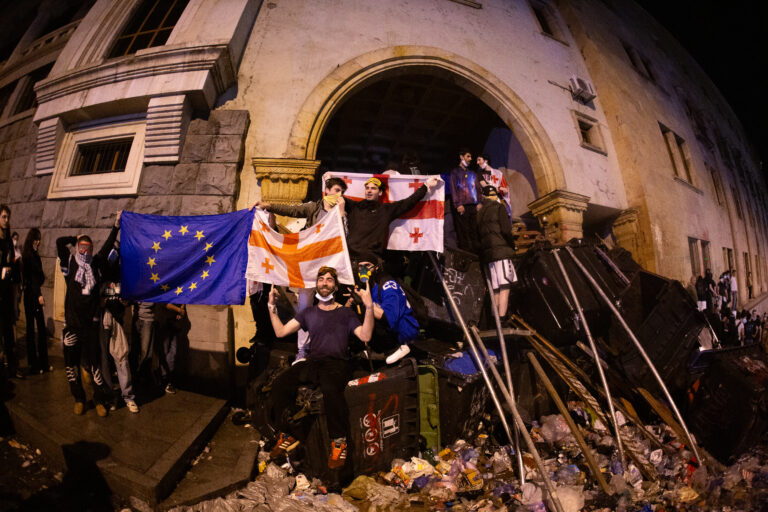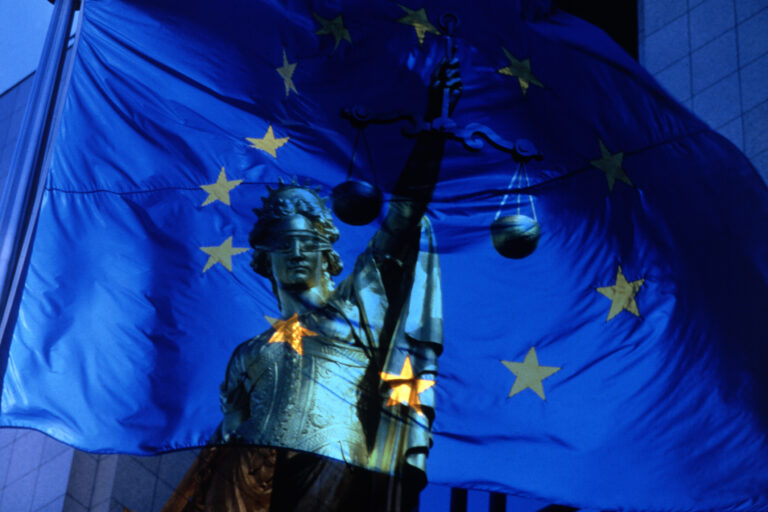The success of EU enlargement cannot depend on geopolitics alone, no matter how much momentum Russian aggression may bring. It will also hinge on the European Union’s capacity to overcome longstanding obstacles and support candidate countries in implementing the necessary reforms. Reform of the European Union itself will play a vital role. But overemphasising the matter runs the risk of dividing pro-enlargement countries and weakening them against integration sceptics. The EU’s saga with Hungary over recent years only heightens the urgency of finding ways to temper the troubling power of these ‘vetocrats’. Moreover, the EU will need to be realistic about the limitations of its use of enlargement as a conflict resolution tool.
One way to keep enlargement on track could be for the EU to separate bilateral disputes – whether between member states and candidate countries or between candidates themselves – from the accession process and work towards their resolution on a parallel track. The potential for disputes to hinder progress will ultimately remain, but this separation could help redress the balance between the political aspects of enlargement and candidates’ progress on reforms and alignment with EU laws and standards. That way, the EU’s and candidate countries’ rediscovered enthusiasm for enlargement may prove more durable this time around. Only then can enlargement serve the geopolitical imperative to strengthen the EU in its turbulent eastern and south-eastern neighbourhoods.
Lessons from the Western Balkans
At some point or another, most countries in the Western Balkans have been blocked in their accession process by one or more EU member states due to bilateral disputes.
Threats of veto from Greece and Bulgaria, for example, have delayed North Macedonia’s membership for more than a decade over such matters as historical names and identity issues. Albania became collateral damage of this wrangling, as its own accession process was coupled with that of North Macedonia. Now, Albania finds itself threatened by a veto from Athens of its own, following the conviction of the Greek minority mayor of Himara in Albania over vote buying and corruption allegations. This is despite the fact that Albania is the most pro-EU country in the region, is fully aligned with EU common foreign and security policy, and has committed to undertake significant reforms. This dynamic is what underpins the enlargement fatigue that spread across the region over the past decade, and undermines governments’ motivation for reform.
Another example is the Kosovo-Serbia dispute. Specifically, the EU’s condition that progress on accession depends on the normalisation of relations between the two. Despite this condition, tensions have only mounted between the two countries over the past decade. In the meantime, Serbia’s democracy has backslided while Russian influence has grown, further diminishing the prospect of a sustainable resolution of the conflict. Moreover, in 2016 Croatia postponed the opening of two chapters for Serbia, setting out specific demands mostly linked to the legacy of the war of the 1990s.
Bilateral disputes have thus long hindered progress on EU enlargement, and the EU has overused accession in its attempts to effect change. But this approach weakened the credibility of the enlargement process in the Western Balkans and did not result in what the EU wanted: progress on reforms, stability, and economic development.
Bilateral disputes have long hindered progress on EU enlargement, and the EU has overused accession in its attempts to effect change
New candidates, new disputes
Recent candidate Ukraine has already experienced the ‘Hungary treatment’ – and could be next in line to suffer a painfully slow path to accession. Viktor Orban’s blackmail will surely continue, with the rights of the Hungarian minority in Ukraine’s Transcarpathia region a key sticking point. Recently, both countries have engaged more actively in talks to deal with this particular dispute, but the EU needs to ensure that, as these efforts continue, Orban does not use the minority dispute as a pretext to block Ukraine’s EU accession or EU funding.
Moreover, the EU cannot discount new bilateral disputes arising during a candidate country’s accession. In Ukraine’s case, as ECFR’s Ivan Krastev and Mark Leonard have pointed out, this could even arise with Poland – one of Kyiv’s greatest advocates – due, for example, to agricultural disputes. This strengthens the case for separating bilateral issues from the accession process to maintain momentum – as it would allow for a sharper focus on and more agile reaction to any new disputes that arise.
There are already some hints that this approach is gaining traction within the EU: in the recent dispute between Greece and Albania, European Commission spokesperson Peter Stano called on member states not to “raise bilateral issues to the union level, such as in the accession process”. Taking his advice could help revive much-needed trust in the Western Balkans and maintain it in Ukraine (as well as in Moldova and Georgia). It would also make the process more predictable for candidate states and serve as motivation to work on EU reforms. Meanwhile, Orban and other enlargement sceptics would have to come up with new – less credible – narratives to use directly against candidate countries to oppose the accession track – which may be easier to counter.
Decoupling in practice
This is precisely the kind of initiative that member states and candidate countries could try out at the forthcoming European Political Community (EPC) meeting in the United Kingdom, which could act as a platform for mediation and high-level dialogue. The UK itself could prove valuable in such efforts – as a non-EU country but a significant partner of candidates in both the Western Balkans and eastern Europe. For London, this could be an ideal moment to flex its diplomatic muscles and help resolve issues that are also of interest to the UK.
Beyond the EPC, the EU should pursue closer collaboration with the Council of Europe, especially through education initiatives that address the teaching of history in post-conflict countries. The Council of Europe’s cooperation with Cyprus to promote diversity and a culture of cooperation when teaching history could prove a valuable transferrable resource. This could contribute to confidence building and reconciliation efforts between different ethnic and national groups across the candidate countries.
In more complex cases, such as the Kosovo–Serbia conflict, Western-led diplomatic efforts should continue, but the EU should bear in mind that the ‘accession as a stick’ element has not helped so far and that seems unlikely to change today. Serbia’s president Aleksandar Vucic has deliberately turned the country against the EU and everything it represents; Kosovo’s prime minister Albin Kurti has ignored the EU’s pressure over the years and delayed the implementation of agreements. If nothing else, Kosovo needs to become a member of the Council of Europe to complement efforts on normalisation, including the implementation of the Brussels agreement and improving the situation of the rights of the Serbian community in Kosovo. The EU also needs to reassess its Serbia strategy and engage with the opposition to dismantle state capture. This will be crucial to revitalise Serbia’s journey towards EU accession and create the parallel condition for the normalisation of relations with Kosovo.
All of this could not only reduce the obstacles the candidate countries face in their accession journeys, but increase European and Western influence and help counter that of Russia.
Breathing space
The EU should use the space created by decoupling to rechannel its energy on supporting candidates to meet the accession criteria and strengthen their economies, as well as their institutional and resilience capacities.
The European Commission’s recent Growth Plan for the Western Balkans, which represents €6 billion in grants and loans to accelerate economic convergence with the EU, is a positive step in this direction. But it is currently unclear whether Kosovo or Serbia can benefit from this due to the conditions related to the settlement of their dispute. To achieve its aims, however, the commission should extend its benefits to all countries, regardless of the state of their bilateral relations.
Similarly, the European Peace Facility is one of EU’s most relevant security instruments. It has been fundamental to Ukraine’s existential fight against Russia’s brutal war, and in building Moldova’s and potentially Georgia’s resilience capacities against systematic hybrid threats from Russia. Creating conditions for a Ukrainian victory and pushing Russia back from the region are essential prerequisites to enable and ensure the success of the integration of these countries into the EU. The EU cannot allow this instrument to falter due to enlargement sceptics’ obstruction, particularly with a potential second Trump presidency on the horizon and with Russia closely monitoring any sign of weakness in Western support for Ukraine to exploit in the ongoing conflict.
As candidate countries align more closely with the EU, and as their economies take off, bilateral disputes over such matters as justice and minority rights might diminish in importance – as they are an integral component of the political criteria that candidates embrace and therefore address during the alignment process. A greater weight on reform and alignment and making more space for candidate countries’ progress in these areas could therefore also enhance the diplomatic track and promote dispute resolution. The tracks could then reconverge at the latter stages of the process under chapter 35 of the acquis, based on which member states decide whether to grant accession or request additional efforts on resolution of conflicts.
*
The road to EU membership is and will remain inherently political. For all candidate countries, the European perspective and the accession process are the main drivers towards political stability, economic prosperity, and alignment with the West. But the heightened involvement of foreign actors in these regions has challenged this assertion. The EU should approach candidates as equals and the partners it needs today to resist the influence of these actors, and as future member states it will need to work with in a collaborative and constructive manner. It should therefore uphold its commitments by ensuring that EU enlargement remains credible, predictable, and as unobstructed as possible.
This paper was first published in European Council on Foreign Relations on 8 April 2024.



